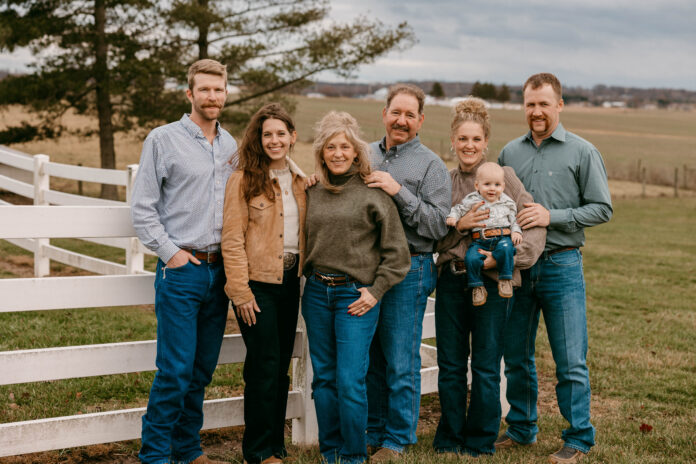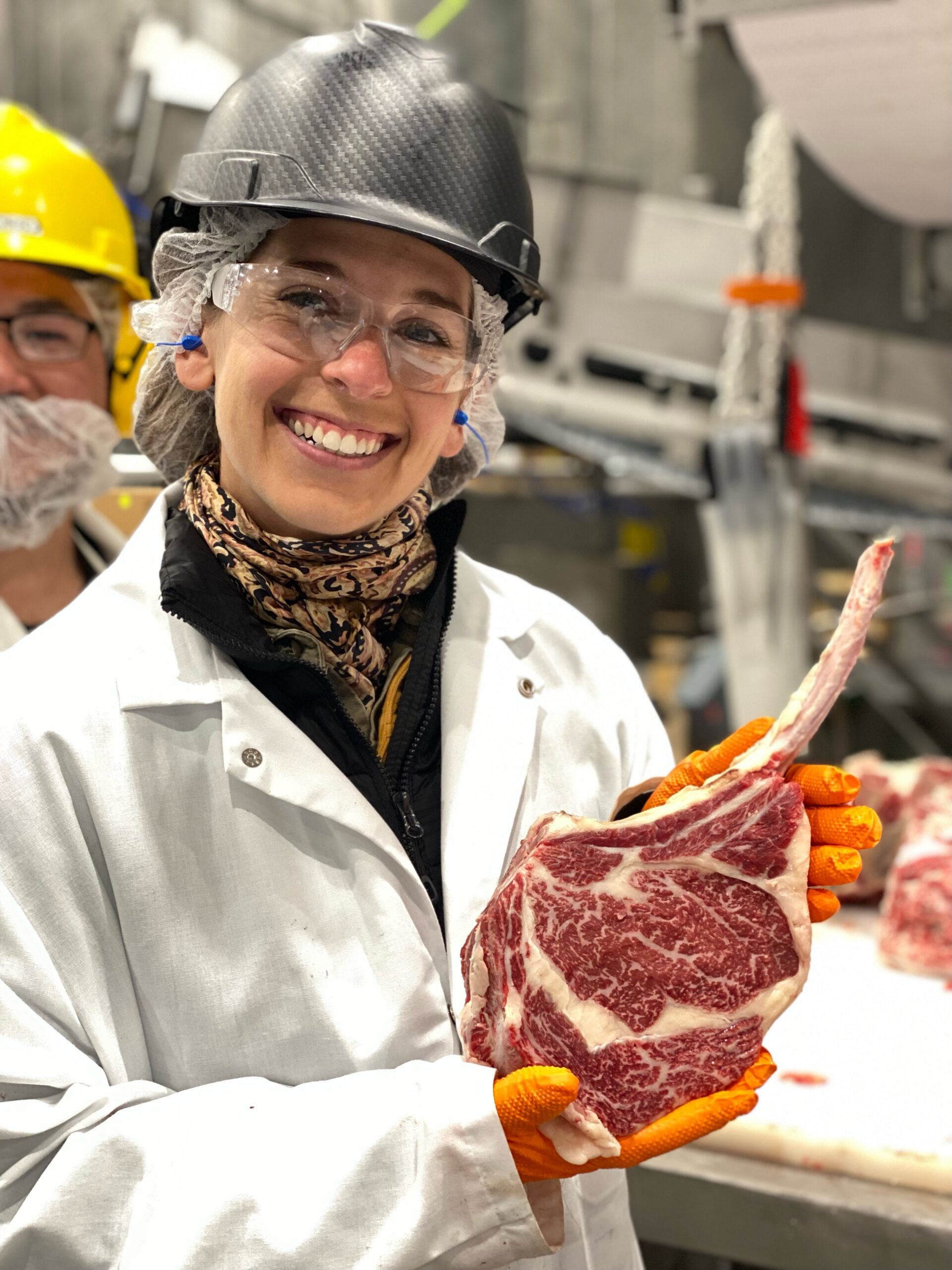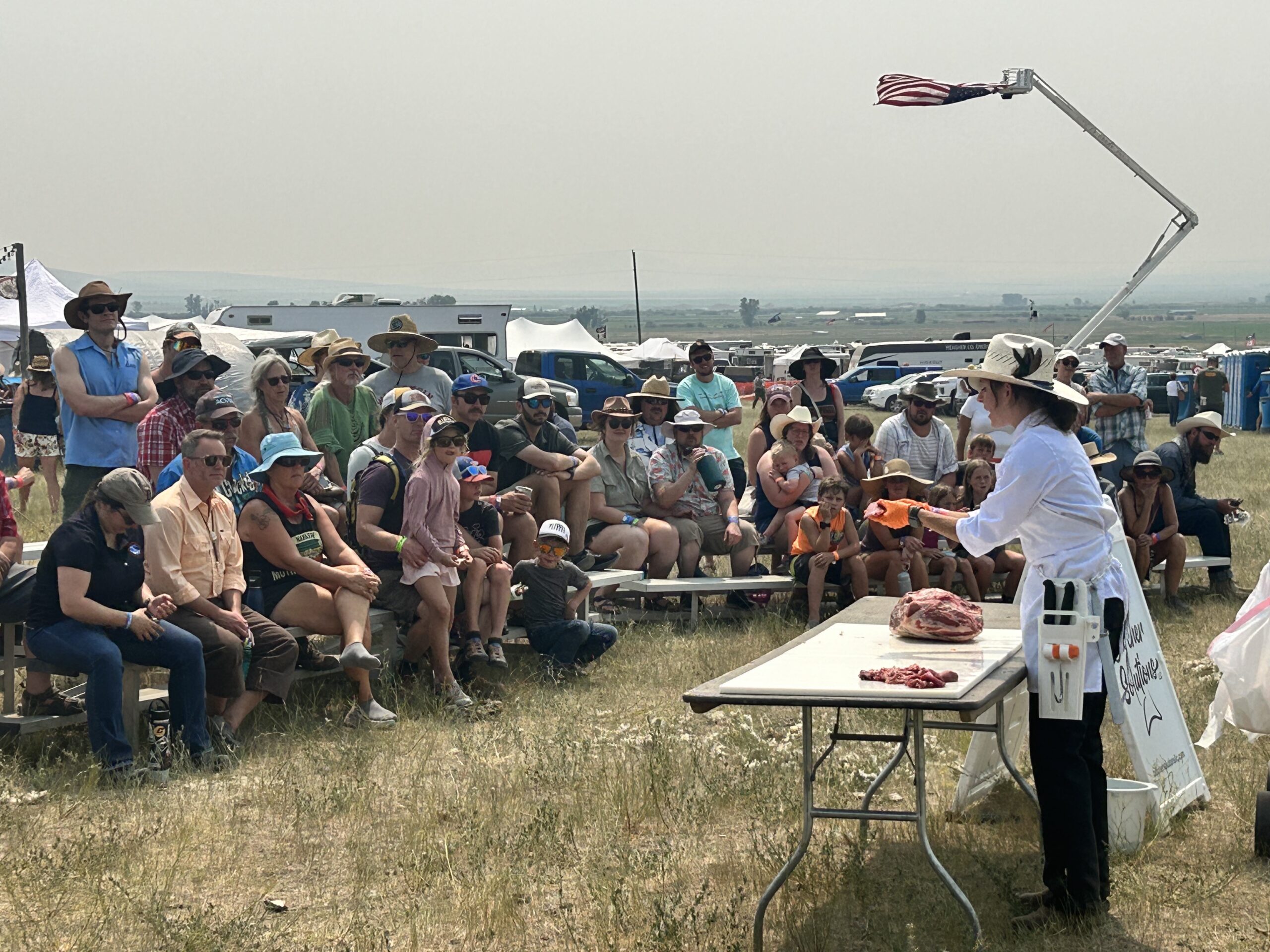
SALEM, Ohio — For the Jepsen family, farming is in their blood, and that blood goes beyond borders when it comes to the family farm — a product built from years of sacrifices and hard work.
Dusty Rose Farm, in Amanda, Ohio, is run by Shelly Dee and Jim Jepsen, and their daughters Cheyenne Erb and Sierra Jepsen.Dee, Jim and Cheyenne raise and breed cattle in Ohio, while Sierra coordinates with butchers from her home in Montana. Despite the miles between them, Dusty Rose Farm is the link that keeps the family together.
“Once it is in your blood and your DNA, you can’t get rid of it,” Jim said. “You can have other jobs, you can do other things, but when that’s what you grew up with, that’s your first love, and that’s how (the girls) got into the family business.”
The beginning
Dee and Jim bought their farm in Fairfield County in 1990, the same year they got married. They named the crop and beef cattle operation after the color dusty rose, which was Dee’s wedding color. Their farm is about 10 miles south of the farm Jim grew up on.
Jim, who was named Ohio’s 2024 Master Farmer, had roots in beef cattle going back to his grandfather, although he’s the first in his family to farm full-time. He was in 4-H and FFA in high school. He knew he wanted to farm for a living, but his mother made him go to college first, according to a 2024 Farm Progress story on Jim.
So, he went to Ohio State University, which is where he met his future wife, Dee. Jim earned a degree in animal science in 1988 and returned to his family’s small farm afterward. He worked an off-farm job for several years before the couple bought what would become Dusty Rose Farm and began farming full-time in 1991.
Dee grew up in Tuscarawas County, Ohio, surrounded by agriculture. Her grandfather ran a small cow-calf operation, with help from her dad and uncle, where they processed their own meat. She spent many weekends and summers helping bale hay and packing meat. From a young age, she knew she wanted to go to school for agriculture, but she wasn’t sure what route to take.
“Farming was not economically the place to be at that time, and especially if you were a female. My parents didn’t understand why I would want to go into an agricultural field. They thought I should just find other pursuits,” Dee said.
Despite her parents’ concerns, she enrolled at OSU’s Agricultural Technical Institute in Wooster in 1983. There, she became the first female president of the Hoof-n-Hide Livestock Club. She earned her associate’s degree in 1985.
“My dad said at graduation, ‘Well, I hope you’re going to go on for school.’ And I said, ‘I’m glad you brought that up, Dad, because I’m transferring to Columbus, and I’m going to continue in agriculture,’” Dee said. “So, at that point, I think they knew that they lost me to college. They were pretty proud of me, too, I have to admit.”
Dee got her bachelor’s degree in animal science at OSU’s main campus in 1989. She went back to get her master’s in agricultural education in 1992. During that time, she also worked for OSU doing agricultural safety inspections on farms; this job would influence the trajectory of her career at the university. Dee has worked in the OSU Agricultural Safety and Health Program since then, where she teaches, conducts research and surveys farms to create outreach programs.
The couple’s strong work ethic has been passed on to their daughters, who have a central role in the business today.
“We’re very proud of them. We’re proud that we can even have this kind of lifestyle and involve them,” Dee said. “We weren’t sure we were actually big enough as a family farm to have the whole family involved. We thought maybe we’d have to diversify into a whole other industry. But thankfully, we did not have to do that. We’re blessed that they even still want to be involved, that’s the exciting thing.”
Staying close to home
Cheyenne and Sierra’s journey in agriculture started on the farm, but quickly expanded when they joined 4-H and the Amanda-Clearcreek FFA chapter. Cheyenne, 32, knew she wanted to go into agriculture from a young age.
“I was always a daddy’s girl and always wanted to be outside with my dad farming, helping with caving, moving cattle,” Cheyenne said. “I saw nothing else for myself. It was just gonna be a matter of what avenue I went with.”
Cheyenne enrolled at OSU’s ATI in 2011, initially studying landscape design. But quickly, she realized, it wasn’t for her. “I needed to be in the barn at school and with beef kids,” she said. She changed her major to beef production and management and completed two internships. One was in Texas, where she worked on a ranch for a year and a half in the fall of 2013. She also worked with artificial insemination specialists at Select Sires in South Dakota for three months in the summer of 2016.
Cheyenne graduated from OSU in 2017 and worked at the Pickaway Soil and Water Conservation District for two years while working part-time at her family’s farm. She began working full-time at the family farm as a herds manager in 2021.
Dusty Rose Farms currently has 160 head of Angus and Angus-cross cattle, and the family farms roughly 1,400 acres of hay, corn, soybeans and wheat. Jim handles the crop side of the business, while Cheyenne takes the reins for the cattle side. She is AI-certified and handles breeding on the farm, in addition to helping her father make hay and mow pastures.
“I call myself a professional grass farmer cause we’re either making hay or mowing pastures or mowing waterways or doing rotational grazing with the cattle, and in summer months, managing the grass,” Cheyenne said.
The farm also has a feedlot, which Jim built in the early ‘90s. Heifers are moved to pasture after weaning and the rest of the cattle remain in the feedlot for roughly 15 to 18 months before they are market-ready. About 15 to 20 head of cattle are committed to the farm’s freezer beef customers each season, and the remaining cattle go to a packer.
Cheyenne manages the farm’s feedlot before Sierra takes over the butchering side of the business.
“My sister and I always joked, she was the one who was really good at being out with the cattle every single day, feeding the cattle regardless of the weather. She was the one who was going to be raising the critters, and I would be running the business side of things,” Sierra said.
Going the distance
While Cheyenne invested in breeding beef cattle, Sierra, 30, took an interest in the meat processing and marketing side of the business. Jim was not surprised by Sierra’s decision, which blossomed in FFA.
“They were in 4-H as soon as they were able, (at) 8 or 9 years old. They showed lambs and beef cattle, but then, when they got into high school and got into FFA that’s when they started to (develop) their own interests, their own ideas, their goals and ambitions,” Jim said.
Sierra was interested in marketing, participating in FFA public speaking contests and serving as a state FFA officer. She also attended OSU, studying agriculture business in 2012, and completed three internships while in college, working at a Certified Angus Beef farm, a cattle ranch in Montana and a packing plant.
It wasn’t until she took a meat science class during her senior year that her passion for the butchering side of beef cattle came to a point. “I had a blast buying knives instead of books and learning all the scientific names of muscles,” Sierra said.

By the second day of class, Sierra had joined the meat judging team and eventually enrolled in a fifth year to take more meat science classes. Sierra graduated from OSU in 2017, alongside her sister.
“That was a great date,” Dee said. “They graduated the same semester, the same time. It was awesome. We had a two-through OSU party,” she laughs.
After graduation, Sierra accepted her “dream job” running the University of Wyoming’s Cowboy-Branded Meats Program, focused on meat judging, meat science education and mobile butcher training. Part of the job entailed taking students to meat-packing plants to practice. It was during these visits, which took place at the start of the COVID-19 pandemic, that she envisioned her next job: working for a traveling butcher school.
“I would ask the guys and gals running the shop, ‘How are you doing?’ And their answer was always this excited, ‘We’re doing great. Business has never been better. The community has never been more fired up about locally available meat products. However, we are having a hard time finding and retaining skilled labor,’” Sierra said.
Sierra started looking at butchery classes, but she couldn’t find any. “There weren’t opportunities to learn butchery outside of YouTube or to read a book,” Sierra said. “And that’s where my gears started turning.”
Sierra went on to pursue a master’s degree in meat science at the University of Idaho in 2021, with the goal of becoming a better butcher. To do this, she attended any meat-cutting demonstrations she could.
She graduated from the University of Idaho in the fall 2022, and that December, she started her business, Butcher Solutions LLC, a traveling butcher school and meat science education program that also does industry consultations. Since then, she has taught courses all over the country.

Sierra’s work for Butcher Solutions also allows her to help out on the family farm back home; she deals with freezer beef by coordinating with butchers and customers.
Jim and Dee were not surprised that Sierra still wanted to be involved in the family, despite the distance, and say she is the best person for the job. She can explain different cuts and answer customer questions on carcass quality, Dee said. Sometimes, Sierra even knows more about the family’s customers than her folks back home.
But juggling a business while helping on the farm in Ohio is no easy feat. The experience has made Sierra appreciate the hard work her parents put in when the sisters were growing up — driving the kids to various school clubs, all while running a farm and working full-time jobs on the side.
Jim and Dee are both proud of their daughters, which has led to new ideas and a growing operation. But for the sisters, the pendulum swings both ways.
“They just made it look so easy, running the farm and having a full-time job in town. I hope I didn’t take if for granted how cool my mom was teaching at Ohio State and how big of an impact she has on Ohio agriculture,” Sierra said. “My sister and I got every opportunity in agriculture that we ever could’ve wanted, just because they made sure that we had every opportunity that we wanted to.”
(Liz Partsch can be reached at epartsch@farmanddairy.com or 330-337-3419.)









